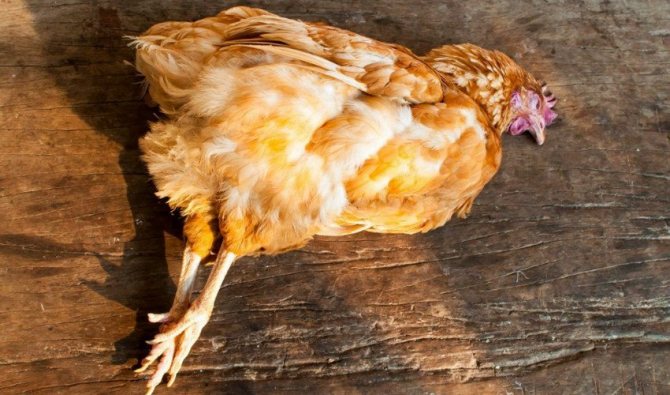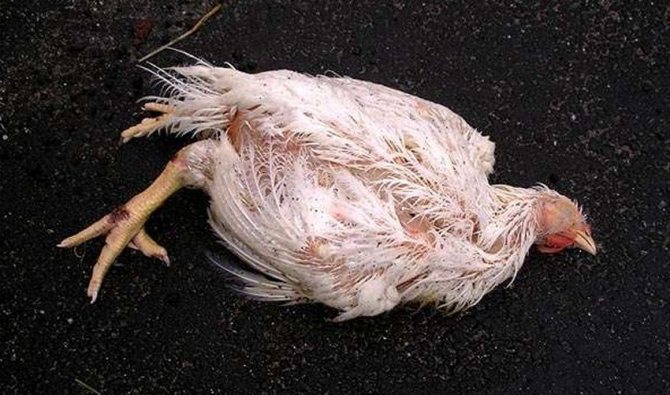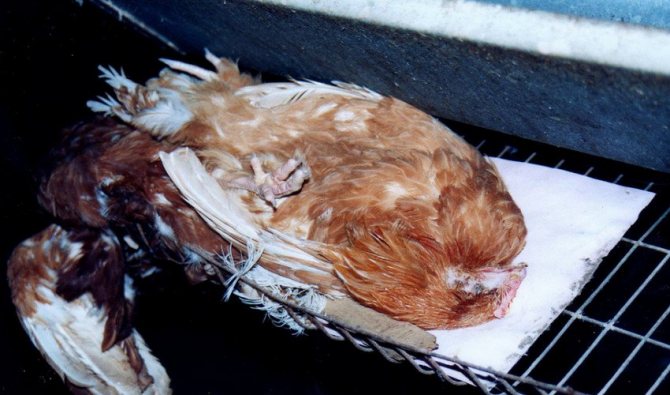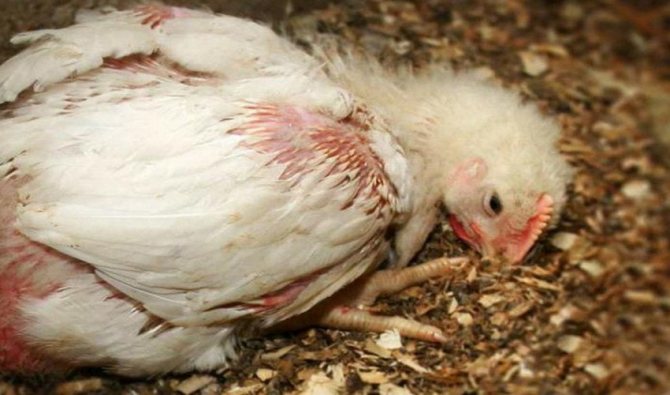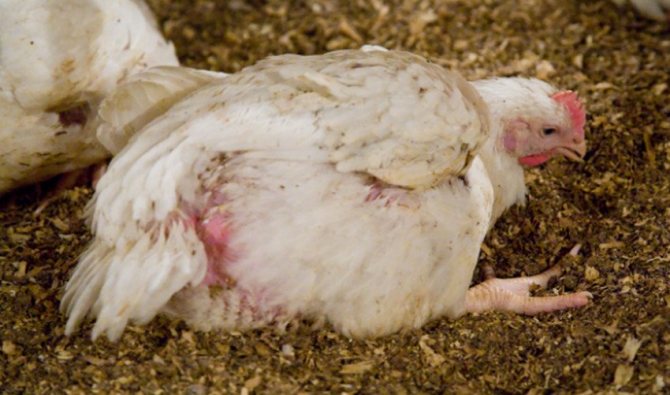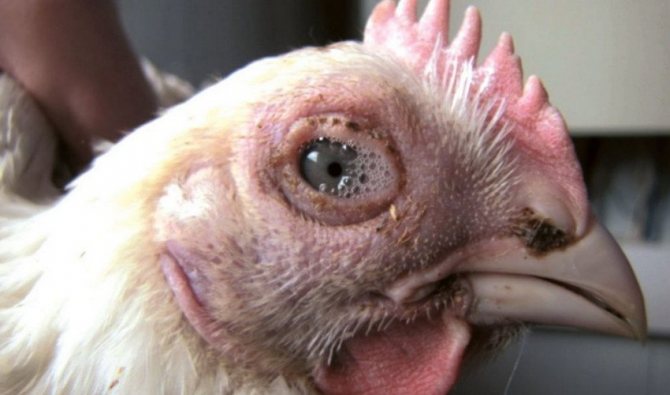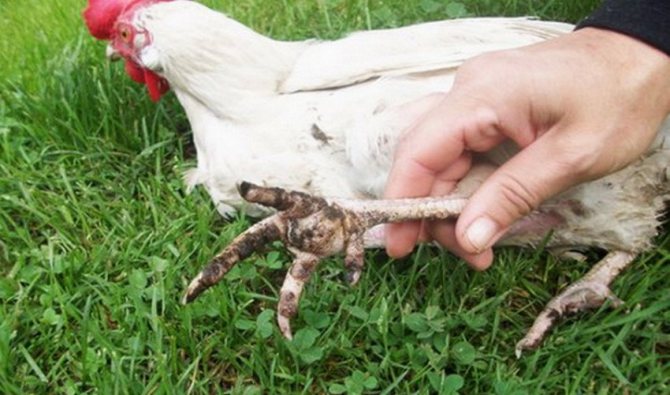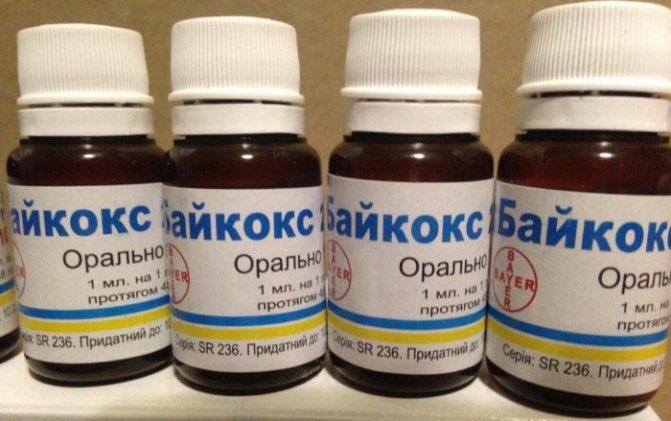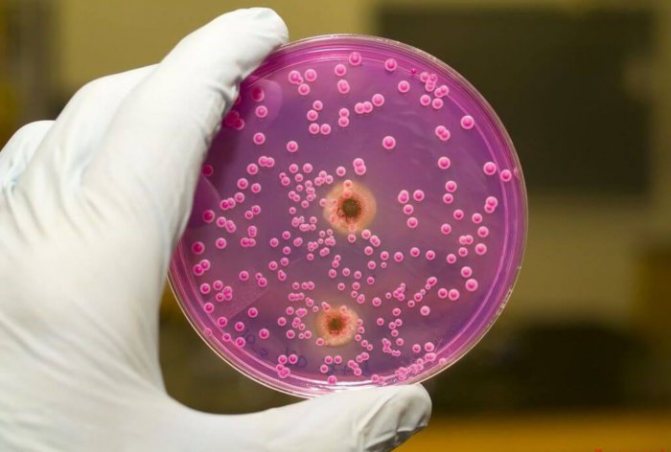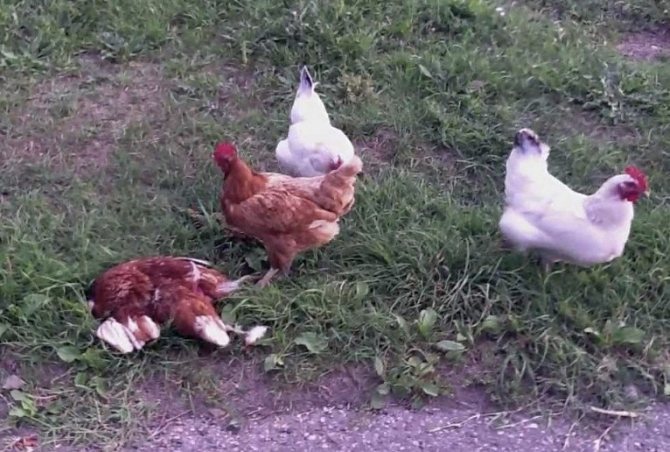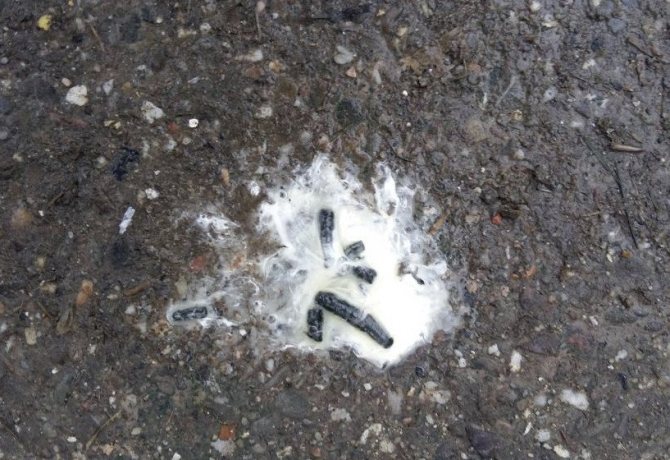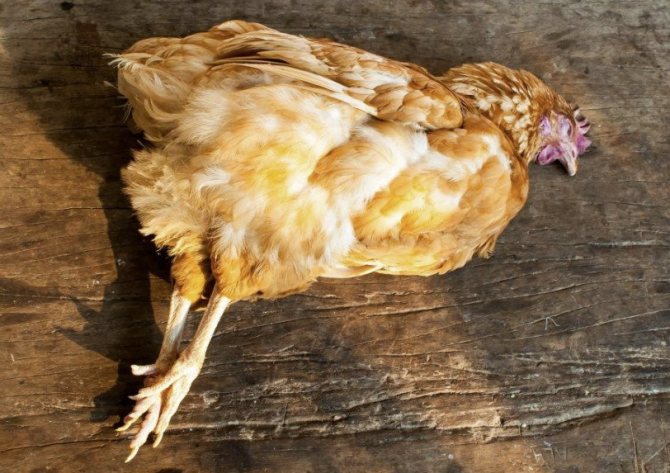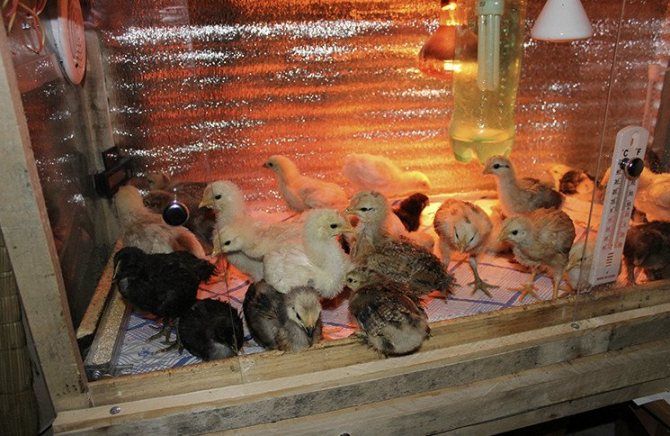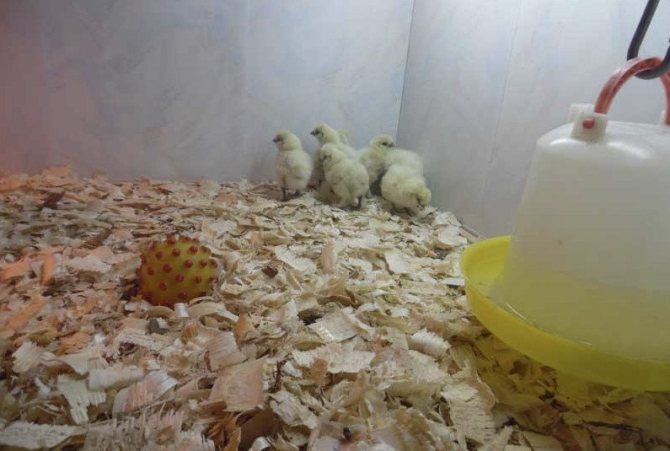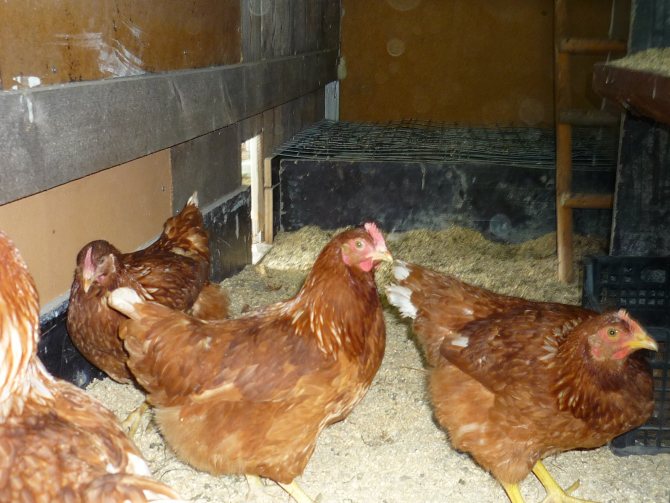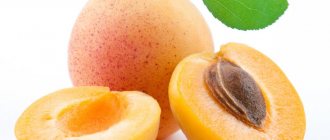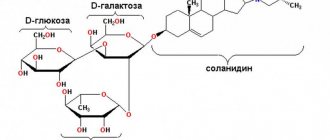The main reasons for the loss of birds
In 90% of cases, the death of chickens begins suddenly and is very rapidly gaining momentum. Veterinarians identify the following reasons that can have this effect:
- feeding problems;
- creation of unfavorable living conditions;
- diseases and infections.
Each of the above factors can provoke death, both independently and in combination with other circumstances. To establish the true cause, sometimes you have to seek help from specialists.
What causes the death of chickens
The cause of a single or mass death of young animals can be:
- Coccidiosis
- Ornithosis
- Pasteurellosis
- Esherichio
Secondary reasons include:
- Purchase of defective young animals.
- Rasklev (cannibalism)
- Incorrectly selected feed.
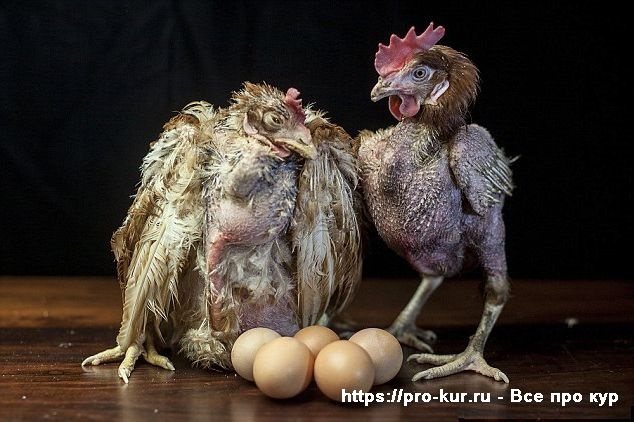
Improper feed and its effects
The first thing you should pay attention to is the food that is given to the layers. This species of birds is picky in terms of food and the absence of the necessary substances in their diet can kill the bird. The same result will come when the diet is excessive.
Why do chickens die from food? Each organism has its own set of nutrients and minerals necessary to maintain life. Going beyond it, or vice versa - failure provokes problems in functioning. The systematic use of such food by a bird leads to its death.
Most often, this problem occurs due to the purchase of low-quality feed. It can be detected by observing the farm itself. Lethargy, decreased activity and appetite, and changes in litter are the first signs of a problem.
Infectious diseases
The most dangerous and unpredictable diseases are infectious. Broiler chickens are dying due to the most dangerous avian influenza virus. The epidemic affects both two-month-old and mature individuals. In just 1-2 days, all the roosters and layers on the farm die. The disease is not cured. All birds in contact with the sick individual will die, so they get rid of the infected.
Avian influenza is less commonly diagnosed than other infectious diseases.
The most common causes of their occurrence are contaminated feed and contact with sick birds and other carriers of the virus. Chickens will also die from such diseases:
- Typhus. Infection occurs during egg-laying or in the first days after birth. Two-month-old individuals are already immune to this disease. Signs: loss of appetite, lethargy, white liquid feces.
- Salmonellosis. Causes weakness, photophobia, purulent discharge from the mucous membrane, diarrhea.
- Pasteurellosis. Occurs due to feeding birds with feed contaminated with an infection. Individuals lose appetite, are inactive, go blind and die.
- Smallpox. It is characterized by the formation of pockmarks on the skin, shortness of breath, and mucous discharge from the beak.
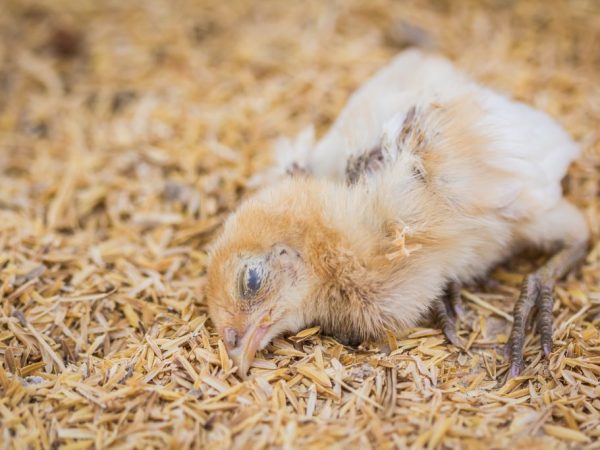

It is necessary to clean up litter and uneaten feed from chickens more often, as it can become a source of germs and viruses
Coccidiosis is also dangerous. The infection leads to sudden weight loss, lethargy, intense thirst and discoloration of the droppings - it turns green.
Unsuitable living conditions
It is assumed that external factors influence the egg production. But, a systematic or severe violation of the conditions becomes the cause of the death of the bird.In spring, winter and at any other time of the year, the temperature and humidity in the laying room should be the same.
Experts recommend artificially creating the necessary conditions and maintaining them all year round. Chickens especially react poorly to drafts and low temperatures, from which they die very often.
An adult chicken requires no less scrupulous attitude towards itself than a chicken. Negligence threatens the loss of the entire pack. Therefore, the issue of conditions should not be taken lightly.
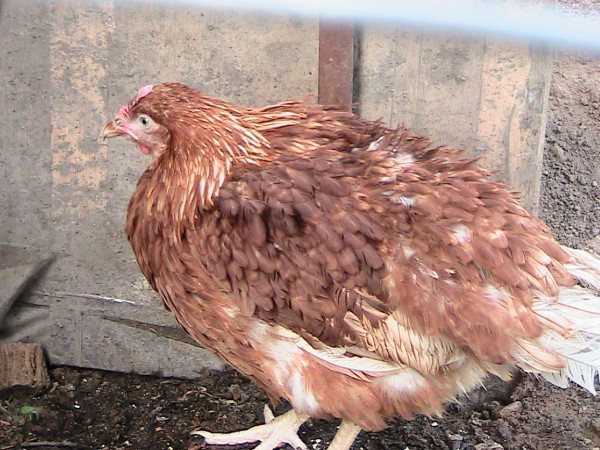

Avoid drafts and strong temperature changes
In what periods of life do broiler chickens most often get sick?
Very often breeders of broilers and other types of poultry are faced with the fact that a few days after acquisition, one chicken dies. After a while, you may notice that several more chicks have died, and so on until the entire herd of chicken dies down, which will entail large financial losses.
There are several dangerous life gaps in the life of poultry. During these periods, chicks are most susceptible to infection with various infections and diseases, respectively, to death.
This is the period from the 1st to the 6th day, from the 20th to the 25th and from the 35th to the 40th days from the moment of birth. On these days, the owner is obliged to show special attention and care.
Disease and infection are the worst enemies
For every poultry farmer, the appearance of an infected individual becomes simply grief. The disease not only affects one individual, but can also spread to other birds, as a result of which most of the flock is lost, or even the whole flock.
The most common infections from which chickens die are recognized:
- ascariasis;
- coccidiosis;
- salpingitis;
- Newcastle disease.
Ascariasis is characterized by the appearance of worms in the intestines of the chicken. Why do they die? Worms release toxic substances that negatively affect the general condition of the body and can lead to rupture of internal organs. The greatest danger is that the disease is contagious and can be transmitted to other individuals.


Roundworm
Coccidiosis is caused by unicellular bacteria. In most chickens, it can be transmitted to adult chickens. Chickens die from ruptures in the intestinal tract. The first signs are: decreased appetite, low activity, blood in the droppings.
Salpingitis affects the egg production system. In the chicken, the internal organs responsible for the oviduct are affected. The first sign is that the hen has laid an uncovered egg. There is a general lethargy of the bird, apathy.
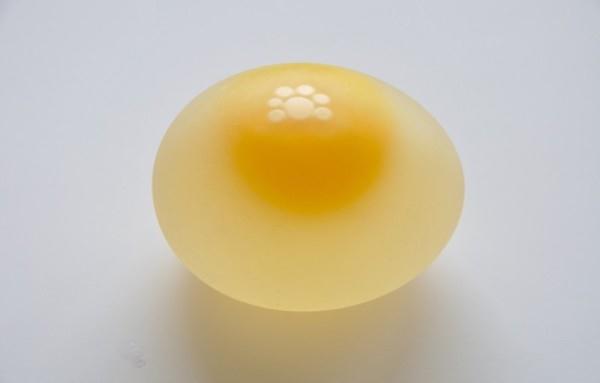

Egg without shell
The most serious problem is Newcastle disease. From this disease, the bird dies in 10 out of 10 cases. Damage to the nervous system is characteristic. There is an unnatural twitching of the head and a failure of body coordination, fluid from the nose and beak, the ridge becomes blue.
from what chickens die in winter
Constantine | 01.21.2013, 10:14
For some reason, chickens are dying. One by one after severe cold weather. I keep it in an old bathhouse, sawdust on the floor (frozen), the light is always on a 60 W light bulb, I feed it with barley porridge and cleanings Almost until the end of December, there were no problems. What to do, instead of 5 chickens, 3 pieces are left.
Anna | 12.01.2013, 15:08
Chickens drink eggs. what to do. Help who knows what.
earring | 01/04/2013 at 20:20
Hello ! forumchene. - good care is needed for the chickens to rush after them. I have spring chickens, which we ourselves bred in the incubator, by the way, I made the incubator myself, so at 5 months my chickens began to lay, now it's already very good in January, one chicken laid about 20 eggs and we burst and put it on the testicles, now for a week we have been enjoying the multi-colored clings. the most important thing is to devote more time to your pets, and to feed them with balanced food, they certainly write a lot of good advice on the Internet, it is not always worth listening to everyone, you need to learn from your mistakes, in the morning we feed with compound feed, which we ourselves prepare in the evening in the morning. , hammer. shell from eggs. compound feed and additive hazel-grouse or sorceress. but that's not all in the flock should be warm and light. and your chickens will not have time to put on testicles and will give you ichkamii all winter long, and for now, if you ask questions, I will answer
Xperia | 12/29/2012, 01:43
Assalam aleikum friends! I have such a problem. The chicken began to lay but the eggs are empty and without the shell just a film there is a place for the eggs. Why is that? Help who is not difficult?
How to deal with the problem?
The first thing to do when the chicken is dead is to go to the laboratory. The carcass of a dead bird is brought for examination to special institutions, where experts find out the causes of death. During this time it costs:
- change food and water to the rest of the individuals;
- disinfect poultry habitats;
- check the flock for suspected sick individuals and isolate them.
If the laboratory has found out why the chickens are dying, you should immediately start treatment. If the problem is in the food or conditions, replace the food completely and set the appropriate temperature regime (22 ° C) and humidity (50%) in the room. Each disease has its own approach:
- with ascariasis, the chicken should be mixed with special preparations (for example, Piperazine) in the feed in the morning;
- coccidiosis is also treated with supplements such as coccidiostatics;
- salpingitis requires a balanced diet. It is necessary to exclude protein as much as possible from the feed. If the oviduct falls out, then only a veterinarian can help;
- there is no panacea for Newcastle disease today. What to do in this case? It is necessary to dispose of an infected bird, and vaccinate a healthy one.
That is, the answer to the question of why laying hens die in summer, winter or at any other time is ambiguous. Everything directly depends on the specific symptoms and influencing factors. The best solution would be to go to the veterinarian and the laboratory. They will help determine the cause and deal with it as quickly as possible.
Preventive measures
Having highlighted all the possible reasons due to which the mortality of chickens on the farm occurs, it is worth paying attention to preventive measures. Every owner should not be dismissive about keeping chickens. In order to protect your pets from various ailments, you should read the following tips:
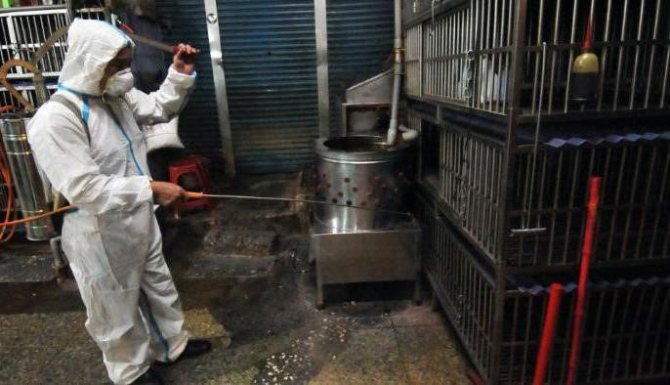

Disinfection of the chicken coop
- Carrying out disinfection measures in the premises before disembarking a new livestock, regardless of whether it is an adult or young bird. General cleaning and whitewashing of the walls are mandatory.
- The optimum temperature in the hen house is +23 degrees for an adult bird, and +29 degrees for young birds. It is important that the room is free from dampness and drafts.
- All poultry should receive vitamin complexes according to the instructions.
- To prevent the occurrence of rickets, fish oil is added to the bird.
- Feed should be varied, and not consist only of compound feed.
- Boiled potatoes are not given in large quantities; an excess of it can be fatal. You also need to give grain very carefully, carefully getting rid of low-quality products.
- In spring and summer, if possible, birds should be allowed to walk in specially equipped aviaries.
- Provide electricity to the chicken coop so that hens are provided with light for at least 11 hours a day. Otherwise, there is a deterioration in egg production, as well as baldness.
Similar articles:
- Signs of vitamin deficiency in chickens
- Chickens fall to their feet in winter: what is the reason?
- A little pigeon twirl and a danger to humans
Pathogenesis
Putrefactive microbes use the retention of food, as a result the goiter is clogged. Released metabolites poison the body, causing depression. Overcrowding of the chicken proventriculus and becomes the reason for refusal to drink and eat. Dehydration sets in, the bird lies or sits ruffled. In industrial conditions, the chicken is discarded, and the owner of the chicken coop may try to cure it.
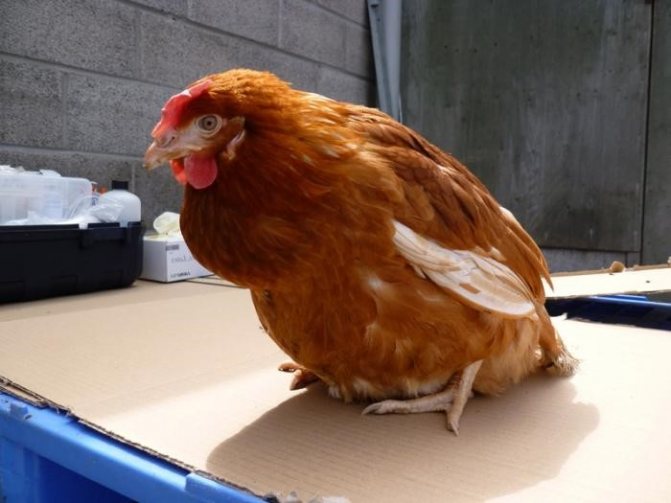

The goiter is clogged
Pathology is detected when examining a bird with a dried or pale scallop. It stops rushing, it becomes light. If the goiter is blocked, the bird is slaughtered.In candidiasis, the expansion of the esophagus resembles a ball filled with liquid. The smell of sour milk spreads from the chicken's beak.
Tips from experienced poultry farmers
To protect and prevent poultry from various diseases and misfortunes, it is worth reading some advice from experienced farmers and poultry breeders:
- Poultry feed must contain sufficient vitamin A. A feed additive made from carrots, fodder beets, fish oil and milk will provide the need for this important micronutrient. Unfortunately, traditional corn and wheat cannot boast of the presence of this vitamin.
- Fresh green grass, rich in vitamin B, is very useful for chickens. Therefore, grazing and access to green vegetation is so important.
- It is recommended to change the main feed every two years.
- For the treatment of gout in laying hens, salicylic acid is added to the drinking water with a dosage of 0.5 tablespoons of acid per 1 liter of water.
- Poultry feed should be balanced. Excessive amounts of protein in the diet of a bird negatively affects its internal organs. The chicken starts to get sick, it has diarrhea, apathy and lethargy, from this the bird can die.
Poultry behavior should be closely monitored. Chickens cannot tell about their ailment, but their appearance and physical condition can signal the presence of a disease and a violation of their vital activity.
https://youtu.be/5vWRV274WcY
Sources:

